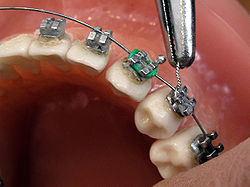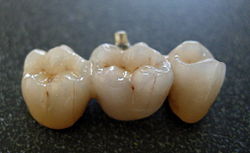Root Canal
A root canal is the space within the root of a tooth. It is part of a naturally occurring space within a tooth that consists of the pulp chamber (within the coronal part of the tooth), the main canal(s), and more intricate anatomical branches that may connect the root canals to each other or to the surface of the root.The smaller branches, referred to as accessory canals, are most frequently found near the root end (apex) but may be encountered anywhere along the root length. There may be one or two main canals within each root. Some teeth have more variable internal anatomy than others. This space is filled with a highly vascularized, loose connective tissue, the dental pulp.The dental pulp is the tissue of which the dentin portion of the tooth is composed. The dental pulp helps complete formation of the secondary teeth (adult teeth) one to two years after eruption into the mouth. The dental pulp also nourishes and hydrates the tooth structure which makes the tooth more resilient, less brittle and less prone to fracture from chewing hard foods. Additionally, the dental pulp provides a hot and cold sensory function.
Root canal is also a colloquial term for a dental operation, endodontic therapy, wherein the pulp is cleaned out, the space disinfected and then filled.
branches that may connect the root canals to each other or to the surface of the root.The smaller branches, referred to as accessory canals, are most frequently found near the root end (apex) but may be encountered anywhere along the root length. There may be one or two main canals within each root. Some teeth have more variable internal anatomy than others. This space is filled with a highly vascularized, loose connective tissue, the dental pulp.The dental pulp is the tissue of which the dentin portion of the tooth is composed. The dental pulp helps complete formation of the secondary teeth (adult teeth) one to two years after eruption into the mouth. The dental pulp also nourishes and hydrates the tooth structure which makes the tooth more resilient, less brittle and less prone to fracture from chewing hard foods. Additionally, the dental pulp provides a hot and cold sensory function.
Root canal is also a colloquial term for a dental operation, endodontic therapy, wherein the pulp is cleaned out, the space disinfected and then filled. Root Canal

A root canal is the space within the root of a tooth. It is part of a naturally occurring space within a tooth that consists of the pulp chamber (within the coronal part of the tooth), the main canal(s), and more intricate anatomical branches that may connect the root canals to each other or to the surface of the root.The smaller branches, referred to as accessory canals, are most frequently found near the root end (apex) but may be encountered anywhere along the root length. There may be one or two main canals within each root. Some teeth have more variable internal anatomy than others. This space is filled with a highly vascularized, loose connective tissue, the dental pulp.The dental pulp is the tissue of which the dentin portion of the tooth is composed. The dental pulp helps complete formation of the secondary teeth (adult teeth) one to two years after eruption into the mouth. The dental pulp also nourishes and hydrates the tooth structure which makes the tooth more resilient, less brittle and less prone to fracture from chewing hard foods. Additionally, the dental pulp provides a hot and cold sensory function.
Root canal is also a colloquial term for a dental operation, endodontic therapy, wherein the pulp is cleaned out, the space disinfected and then filled.


 Dr. Olivia Loeblein grew up in Stoneboro, PA and graduated from Westminster College. She then went on to earn her dental degree from Case Western Reserve University where she was actively involved in the American Student Dental Association and PSI Omega fraternity. She is now back in Western PA and excited to be working close to home. Dr. Olivia enjoys reading, spending time outdoors, and musical theatre. She is currently involved in community theatre and is part of the worship team at church.
Dr. Olivia Loeblein grew up in Stoneboro, PA and graduated from Westminster College. She then went on to earn her dental degree from Case Western Reserve University where she was actively involved in the American Student Dental Association and PSI Omega fraternity. She is now back in Western PA and excited to be working close to home. Dr. Olivia enjoys reading, spending time outdoors, and musical theatre. She is currently involved in community theatre and is part of the worship team at church.



 and odous “tooth”) is the first specialty of dentistry that is concerned with the study and treatment of
and odous “tooth”) is the first specialty of dentistry that is concerned with the study and treatment of 
 tures are removable, however there are many different denture designs, some which rely on bonding or clasping onto teeth or
tures are removable, however there are many different denture designs, some which rely on bonding or clasping onto teeth or  plant
plant are placed within the bone (endo- being the Greek prefix for “in” and osseous referring to “bone”). The bone of the jaw accepts and
are placed within the bone (endo- being the Greek prefix for “in” and osseous referring to “bone”). The bone of the jaw accepts and 
